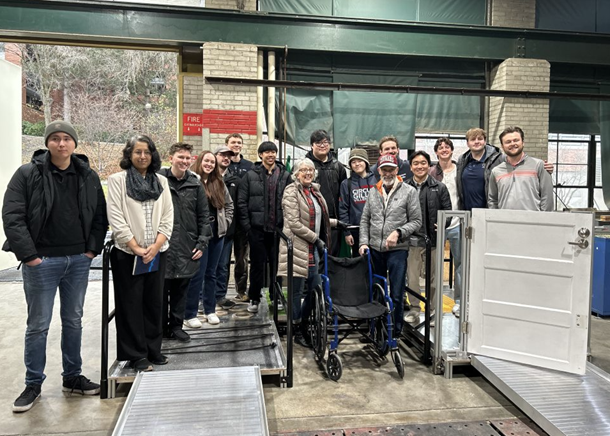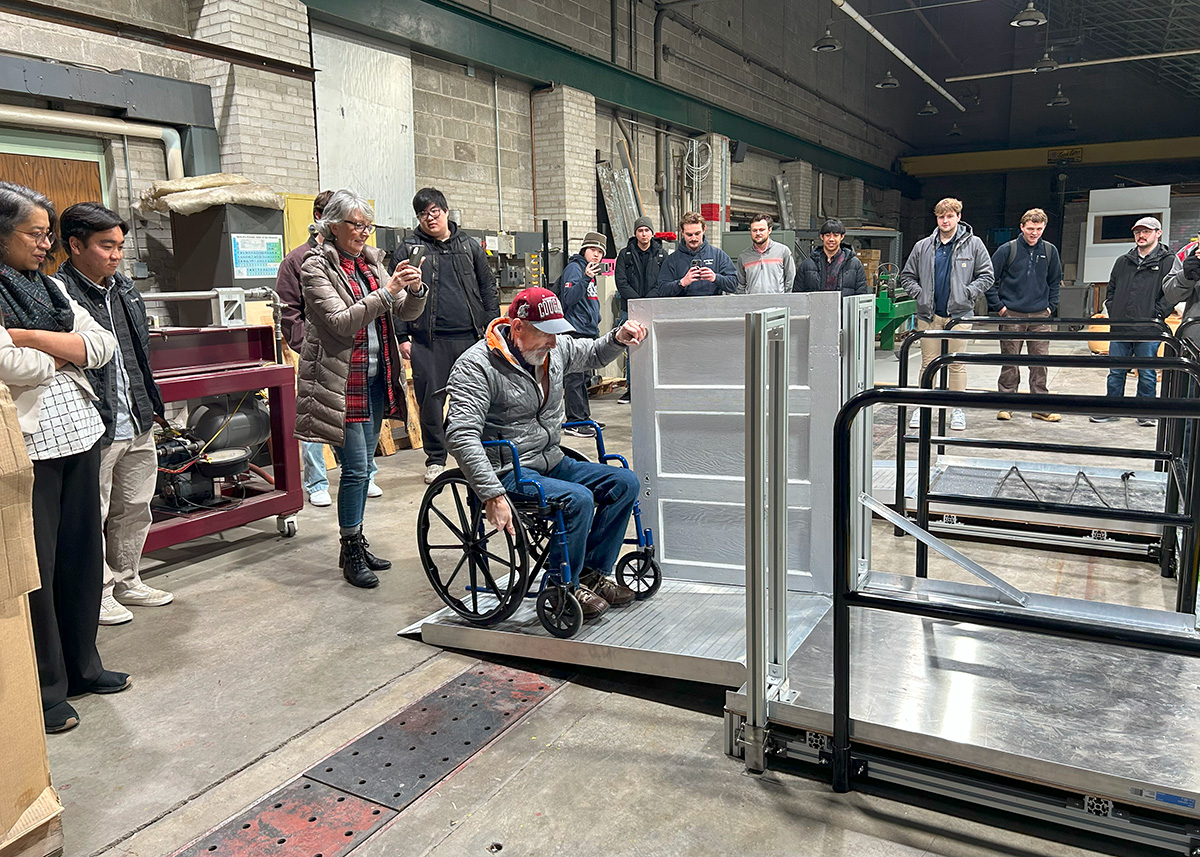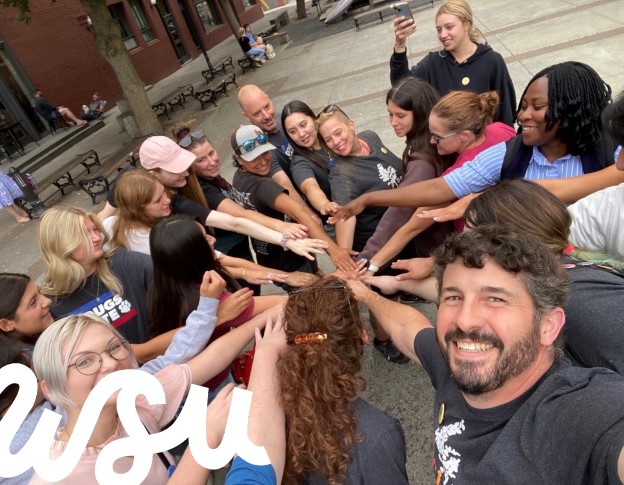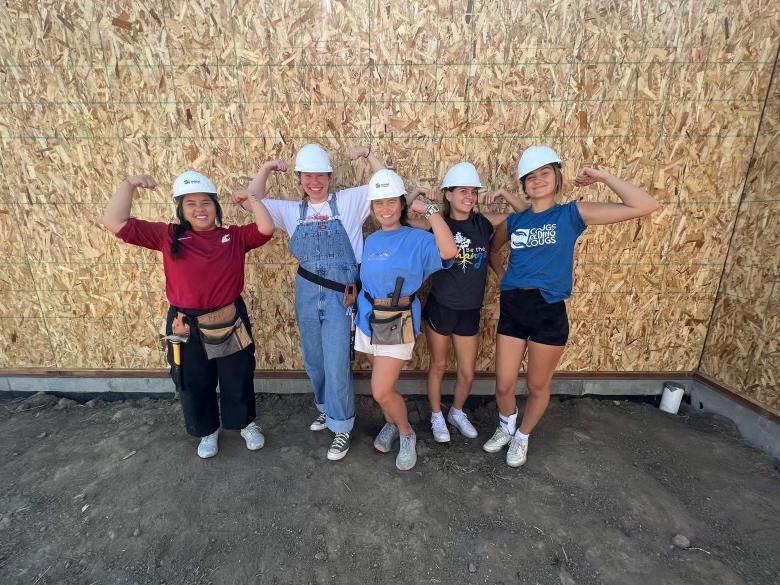What is Service-Learning?
Service learning at WSU supports the university’s land-grant mission by fostering community engagement, expanding access to education, and applying knowledge to address real-world challenges across the state and around the globe. The CCE offers support to integrate service-learning and civic engagement components into courses. We work individually with faculty to provide the types and levels of support appropriate for each course and faculty.
Service-learning is a “…form of experiential education in which students engage in activities that address human, and community needs together with structured opportunities intentionally designed to promote student learning and development” (Jacoby, 1996). Service-learning is a teaching strategy used to advance academic learning through civic engagement.
Service-learning can be integrated into any class in any discipline, allowing students to apply academic concepts to real-world community challenges across all fields of study. The CCE is always seeking new partnerships with faculty across all disciplines.


-
About Service-Learning
Students who participate in civic engagement activities enhance their academic and personal growth in these areas:
- Civic Responsibility: understanding community-identified goals and the responsibility to participate in the democratic process and work toward positive social change.
- Self-Awareness and Efficacy: identify and critically examine one's own values, biases, and interests; respect and appreciate the perspectives and life situations of others; and gain confidence to take action.
- Student Success: acquiring and strengthening knowledge by applying concepts to community-identified goals, leading to success in the classroom and personal, academic, and professional leadership development.
- Commitment to Social Justice: respecting different perspectives within diverse communities; developing and demonstrating knowledge and dedication to issues of culture, diversity, equity, oppression, and power and privilege.
Every class at WSU has a chance to incorporate service-learning ton their course(s). CCE supports you, the student, and your course by:
- Identifying community partners and building a relationship between your course and their organization.
- Assisting with developing projects that help students have a deeper understanding of the course content and community goals.
- Providing ongoing partnership and technical support with GivePulse for students, faculty, and community partners.
-
GivePulse & Canvas
We're excited to share that the GivePulse community engagement platform is now integrated with Canvas! This new feature allows faculty and students across all campuses to connect with community service opportunities, track service hours, and reflect on their experiences, all within Canvas. We encourage faculty to follow these simple steps and edit their Canvas course settings, making GivePulse visible and accessible to students directly within their course space. This helps ensure students can fully engage with community-based learning opportunities through the integrated platform.
-
Course "C" Designation
The WSU Registrar’s Office classifies courses with a “C” designation when they have a service-learning or community engagement component. The Center for Civic Engagement (CCE) manages the process, and the “C” is warranted if service-learning activities (1) Are directly relevant to course content and goals, (2) Address a community-identified need, and are constructed to mitigate any associated risks; (3) Benefit the community (broadly defined) and, as appropriate, provide an opportunity for collaborative partners to receive associated products and/or be involved in the evaluation of the activity; (4) Provide, as expressed in the syllabus, opportunity, and method(s) for students to reflect on what they have learned through their service-learning experience, how it relates to course content, and how it impacts the community; and (5) Options ensure that no student is required to participate in an activity that creates a religious, political and/or moral conflict.
-
CCE Learning Outcomes
CCE has four learning outcomes that are assessed through a student survey, reflection workshops hosted by the CCE, and critical reflection assignments graded by the course instructor. Learning outcomes include:
- Civic Responsibility: Understand community-identified goals and their responsibility to participate in the democratic process and work toward positive social change
- Self-awareness and Efficacy: Identify and critically examine one’s own values, biases, and interests; respecting and appreciating the perspectives and life situations of others; and gaining confidence to take action
- Student Success: Acquire and strengthen knowledge by applying concepts to community identified goals, leading to success in the classroom and personal, academic, and professional leadership development
- Commitment to Social Justice: Respecting different perspectives within diverse communities, developing and demonstrating knowledge and dedication to issues of culture, diversity, equity, oppression, and power and privilege.
-
Characteristics of Civic Engagement
The Characteristics of Civic Engagement ensure that civic engagement is ethical, inclusive, mission-aligned, and community-centered. Each criterion plays a key role in safeguarding the integrity and purpose of civic engagement activities. CCE’s “Characteristics of Civic Engagement” provide a shared understanding and definition of what civic engagement entails, including activities that
- Meet community-identified goals or concerns and/or advance the work of a non-profit or public organization other than WSU
- Benefits a historically excluded population and/or serves the public good
- Require a commitment of time/effort
- Does not support or incite violence, hatred, or discrimination
- Does not replace or compete with an existing campus service
- Does not actively promote a specific faith or solely serve members of a religious group or political organization
- Does not provide direct financial benefit to a for-profit organization.
-
Participation Reports
Reports of participation by students in service-learning courses are provided by the CCE at least twice per semester to faculty to ensure accurate tracking and meaningful oversight of student engagement. These reports typically include details such as the number of verified service hours, the community partners students have worked with, and whether students are meeting course requirements—allowing faculty to monitor progress, address concerns, and incorporate engagement outcomes into classroom discussion and assessment.
-
In-Class Presentations & Workshops
-
Introduction to service-learning and GivePulse at the start of each semester
-
Mid-semester reflection workshops
-
Staff visits to classes for troubleshooting and progress monitoring
-
-
Carnegie Classification for Community Engagement
Service-learning plays a leading role in the Carnegie Classification for Community Engagement because it exemplifies how institutions integrate meaningful community partnerships directly into teaching and learning.

Faculty
Service learning helps faculty attract and motivate a diverse set of learners, enrich classroom discussions, and build cross-disciplinary networks. It fosters stronger ties with local communities, supports research and publication opportunities, and encourages broader engagement across WSU. Faculty can also gain recognition for impactful teaching and meaningful communtiy partnerships through the Center for Civic Engagement (CCE)
Students
Service-learning boosts student retention, motivation, and academic performance. It provides hands-on experience, helps apply course content in diverse ways, develops critical thinking skills, and builds professional networks—all of which enhance resumes and support future career opportunities.
Community Partners
Service learning provides agencies with additional support to meet their goals, while students contribute fresh energy and creativity. It fosters connections with WSU and other organizations, raises awareness of community issues, encourages future civic involvement, and partners to help educate and shape future leaders.
Student Success and Retention
The Center for Civic Engagement (CCE) partnered with Biology 102 in AY18 and AY19, with half of the lab sections incorporating service-learning experiences - structured community-based projects organized by the CCE, including orientation and reflection - while the other half proceeded with the traditional curriculum. This study demonstrates the many benefits a short service-learning intervention can have on student retention and academic success and supports the value of providing first-year students with even just one service-learning experience. Relative to controls, students who completed a SL project achieved higher academic performance, with end-of-semester class grades 9.7% higher and a 9.9% boost in end-of-semester GPAs. In addition, fall-to-fall retention was 9.3% higher for service-learning than for control students. Approval for our study was granted by WSU’s Institutional Review Board, and funding was provided via the Provost’s Student Success Seed Grant Program.
The Engaged Scholar Newsletter
The Engaged Scholar Newsletter is a bi-annual newsletter that highlights and celebrates the successes and ongoing developments in service-learning and community-engaged scholarship at WSU. It features stories about faculty, community partners, and students involved in service-learning projects, shares updates on best practices, and provides insights into how engagement efforts align with WSU’s mission and goals.
The Community Engaged Scholars (CES) program creates a multidisciplinary "community of practice" for faculty interested in developing course(s) that integrate service-learning. This initiative fosters student success and retention by implementing the high-impact practice of service-learning. CES is in direct alignment with the “active engagement in learning” focus area.
Faculty benefit from participating in the Community Engaged Scholars (CES) program because it equips them with the best-practices, tools, resources, and support to integrate service-learning teaching methods successfully into their courses. This innovation creates a high-impact learning environment that connects students directly with local community identified needs, fosters critical reflection, and a deeper understanding of course content. These workshops help faculty across all disciplines design impactful learning experiences that enhance course content, foster civic responsibility, and build strong community partnerships. Additionally, service-learning improves student engagement and provides faculty with professional development opportunities that enrich their teaching and scholarship.

Partners in Innovation: Faculty Recognition
The Center for Civic Engagement and Office of the Provost recognizes faculty and staff for their innovative community engaged learning practices that create transformative and high-impact opportunities for students and communities. Community and student engagement are strategic priorities of Student Affairs and Academic Affairs at Washington State University.
WSU Definition of Community Engagement
We define community engagement as a relationship-based collaboration between Washington State University faculty, staff, and students and local, tribal, state, national, and global partners for the mutually beneficial, sustained exchange of knowledge and resources. Community engagement builds deep, trusted relationships with partners to collaboratively enrich scholarship and research, enhance curriculum and teaching, disseminate programs and practices, prepare engaged and educated citizens, and address critical societal issues to contribute to the public good.
- Curricular engagement describes the teaching, learning, and scholarship that engages faculty, students, and community in mutually beneficial and respectful collaboration. Their interactions address community-identified needs, deepen students’ civic and academic learning, enhance community well-being, and enrich the scholarship of the institution.
- Co-curricular engagement describes structured learning that happens outside the formal credit academic curriculum through training, workshops, and experiential learning opportunities. Co-curricular engagement requires structured reflection and connection to academic knowledge in the context of reciprocal, asset-based community partnership